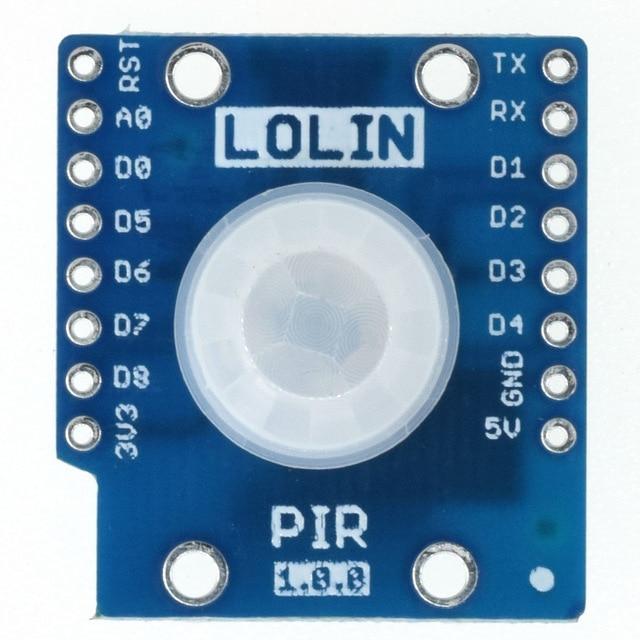In this example we look at a PIR example in Micropython for an ESP8266.
A passive infrared sensor (PIR sensor) is an electronic sensor that measures infrared (IR) light radiating from objects in its field of view. They are most often used in PIR-based motion detectors. A PIR-based motion detector is used to sense movement of people, animals, or other objects. They are commonly used in burglar alarms and automatically-activated lighting systems. They are commonly called simply “PIR”, or sometimes “PID”, for “passive infrared detector”.
If you want to read more basics – https://en.wikipedia.org/wiki/Passive_infrared_sensor
The shield uses D3 so that will be unavailable for any other components or shields you may want to use – The PIR is an AS312
Requirements
Lets take a look a the shields and boards that are required for this example
Parts List
I connect the Wemos Mini to the dual base and then put the DS18B20 shield along side this, you can connect the Wemos DS18B20 shield directly to the Wemos Mini if you want.
| Name | Link |
| Wemos Mini | D1 mini – Mini NodeMcu 4M bytes Lua WIFI Internet of Things development board based ESP8266 by WeMos |
| Wemos Base | Tripler Base V1.0.0 Shield for WeMos D1 Mini |
| Wemos PIR shield | PIR shield |
Code
Create a new file called ldr1.py and import it into uPyCraft
A fairly simple idea here, we read in the state of the pin that the PIR uses
[codesyntax lang=”python”]
from machine import Pin import time ldr = Pin(0, Pin.IN) # create input pin on GPIO2 while True: print(ldr.value()) # get value, 0 or 1 time.sleep(1)
[/codesyntax]
and a slight adaptation to create a more readable output
[codesyntax lang=”python”]
from machine import Pin
import time
ldr = Pin(0, Pin.IN) # create input pin on GPIO2
while True:
if ldr.value():
print('OBJECT DETECTED')
else:
print('ALL CLEAR')
time.sleep(1)
[/codesyntax]
Output
You should see something like this
exec(open(‘ldr2.py’).read(),globals())
ALL CLEAR
ALL CLEAR
ALL CLEAR
OBJECT DETECTED
OBJECT DETECTED
OBJECT DETECTED
OBJECT DETECTED
OBJECT DETECTED
ALL CLEAR
ALL CLEAR
ALL CLEAR
OBJECT DETECTED
OBJECT DETECTED
OBJECT DETECTED
Links
https://datasheet.lcsc.com/szlcsc/Nanyang-Senba-Optical-Elec-AS312_C90465.pdf







